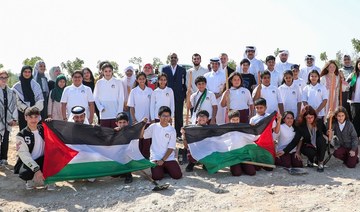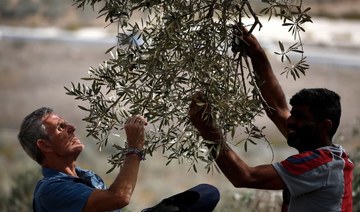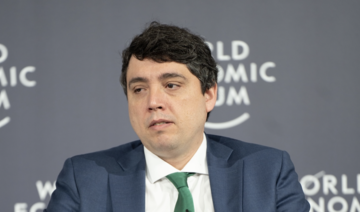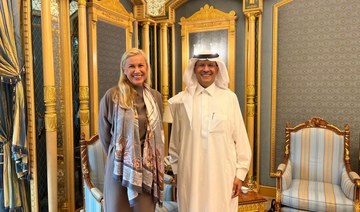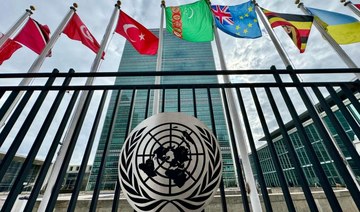The mud-colored Omo River, which snakes through green gorges, feeding lush vegetation and providing vital water to one of Ethiopia’s most remote regions, will also power a contentious dam project.
The government says the Gibe III dam will boost development, give access to power for many Ethiopians — about half of the population — currently living without it, and generate revenue from the export of electricity to the region.
But with construction under way for Africa’s highest dam at 243 meters (nearly 800 feet), critics say Ethiopia must also consider the environmental and social impact it will have on some 500,000 people living downstream and at Lake Turkana in neighboring Kenya. Their livelihoods rely on the river.
“If they’re going to build this huge hydro-power dam than it should be done in a way that benefits the people who are most affected,” said David Turton, a senior research fellow at Oxford University’s African Studies Center.
The Omo River is over 700 kilometers (430 miles) long and supplies Lake Turkana with 80 percent of its water. It is a source of annual flooding for the agro-pastoralists living in the South Omo valley, a UNESCO World Heritage Site.
The completion of the dam in 2014, which will have a capacity of 1,870 megawatts, will regulate the river’s flow and, according to the Ethiopian Electric Power Corporation (EEPCo), offer a predictable water source for communities living along the river south of the dam.
Agro-pastoralists in Omo’s valley have traditionally relied on flood-retreat agriculture for cultivation and animal grazing.
“Before, the wet season was two months, or maximum three months, then there was nine months of drought, now for 12 months there will be a regulated flow for all the downstream users,” said EEPCo. chief executive Mirhet Debebe.
The centuries-old flood-retreat agriculture practised by the downstream tribes is a cultural mainstay of the Bodi, Mursi and Nyangatom tribes, famed for their lip-plate and body painting customs.
But Azeb Aznake, Gibe III project manager at EEPCo, has said artificial flooding would be created annually “so that their practice is not interrupted.” She said the regular river flow would provide irrigation for small-scale cultivators downstream, and denied that the Gibe III dam would feed irrigation channels to nearby foreign-owned plantations, as some groups have charged.
“The purpose of the dam is for hydroelectric power, and nothing more,” the power company executive said.
Most of the $1.8 billion (1.5 billion euro) cost of the project — the third in a series of five dams planned along the Omo River — will be covered by EEPCo, with a Chinese firm bankrolling the $400 million electromechanical costs. The dam has been mired in controversy from the project’s inception and the “Stop Gibe 3” online petition has collected over 18,000 signatures.
EEPCo’s Azeb admitted that any project of this magnitude is bound to have an impact on local communities and ecosystems, but said the overall benefits were too great to ignore.
“Water is our major resource.... We have to make use of it and develop, we have to eat three times a day like any human being, so there has to be compromise,” she said.
Power generated by the dam will be fed to a main transmission and sold to neighboring Djibouti — which is already receiving Ethiopian power — as well as Kenya, Sudan and Somaliland, providing a major source of income, CEO Mihret said.
For Frederic Mousseau, policy director at the US-based think tank Oakland Institute, which is opposed to the dam’s construction, the benefits are not widespread enough.
’There must be concern for social justice’ “It’s really about who benefits and what benefits.... At the macro level you might have increased exports, economic growth, but what about human development, what happens to the people?” he said in a phone interview from California.
He urged the Ethiopian government to halt the dam’s construction “so investment could go toward infrastructure that could really benefit the people.” Some nearby residents welcome the job opportunities that have accompanied the dam’s constructions. Over 4,000 Ethiopians have been hired to help build Gibe III, which was started in 2006 and is over 50 percent complete.
“It is good for our development and the area’s development (because) we get more employment,” said Mengistu Mara, 26, a student in Lala town about 30 kilometers away from Gibe III.
His brother who works as a crane operator at the dam pays Mengistu’s school fees at the local high school, built in 2009 by the dam’s contractors.
“I’m learning now because my brother is bringing me money,” he said, standing in front of the school built near the village’s newly paved road.
Lala resident Desalegn Barata, 41, also welcomed the job creation, but said that even with the construction site next door his community still has no clinic.
“There is no clinic or hospital and there are many diseases here,” he said, swatting at the flies swarming around him in the midday heat.
For analyst Turton, the government should prioritise social justice as the project moves ahead, saying it is possible to balance the benefits with the potential impact.
“This is often presented as a choice between development and what we sometimes call cultural preservation, it’s presented as sometimes you can’t make an omelette without breaking eggs,” he said, adding that he is not opposed to the construction of Gibe III.
“But it should be done in a way that shows a concern for social justice.”
Ethiopian dam spurs debate
Ethiopian dam spurs debate
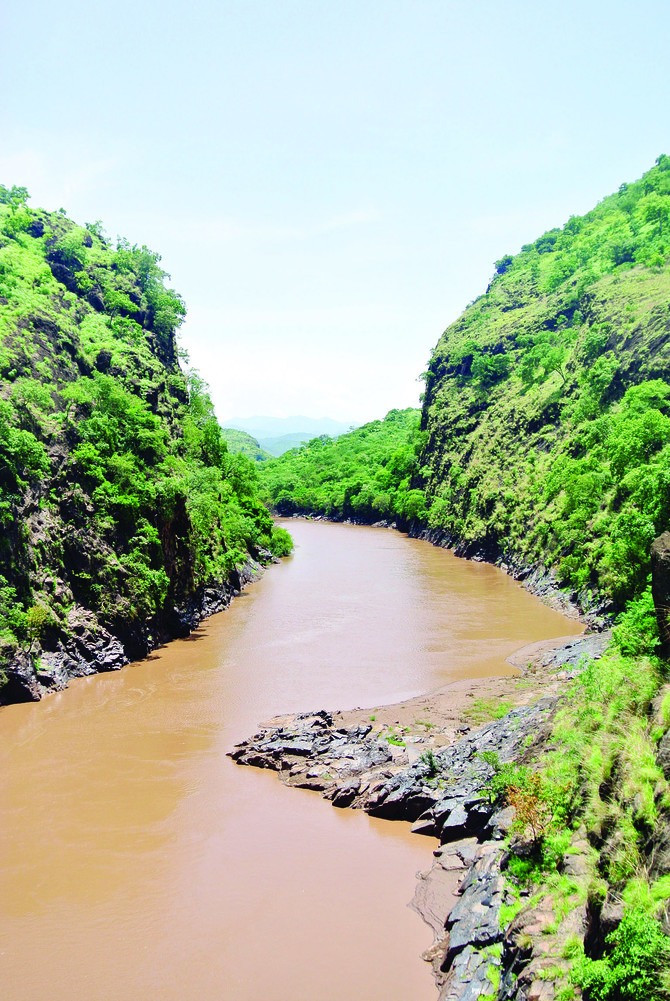
Jordan nominates ancient Mehras olive trees for UNESCO Intangible Cultural Heritage list
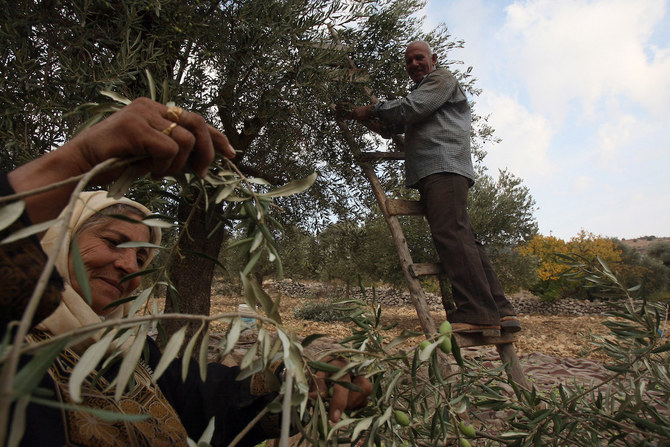
- Culture minister underscored the profound importance of the olive tree in Jordanian society
AMMAN: Jordan has nominated its Mehras olive trees for inclusion on UNESCO’s representative list of Intangible Cultural Heritage for the year 2025, Jordan News Agency reported on Monday.
According to the Food and Agricultural Organization, Jordan has some of the world’s most ancient habitats for olive trees.
Olive trees cover approximately 30 percent of all cultivated land in Jordan, constituting 75 percent of fruit trees. The olive trees hold immense significance for Jordan’s economy, environment, and culture.
Jordanian Culture Minister Haifa Najjar highlighted the importance of the tree to Jordanian heritage, drawing attention to its regional and international significance.
The minister underscored the profound importance of the olive tree in Jordanian society, representing both agricultural prowess and the cultural heritage deeply ingrained in the lives of its people.
She commended the collaborative efforts between the Ministry of Culture and national stakeholders in finalizing the nomination dossier for “The Ancient Olive Tree — Al-Mehras” to be presented to UNESCO in Paris.
Najjar noted the ministry’s commitment to documenting and safeguarding elements of intangible cultural heritage and the positive effect of such nominations on Jordan’s cultural presence globally.
The ministry previously secured UNESCO recognition for Jordanian cultural elements such as As-Samer traditional dance and mansaf, a traditional dish.
The ministry has participated in joint Arab nominations to UNESCO, highlighting the interconnectedness of cultural practices across the region. Previous submissions included files on date palm cultivation and Arabic calligraphy.
Looking ahead, Najjar mentioned joint Arab nominations currently under consideration for the 2025 UNESCO list. These encompass an array of practices and traditions, including mud architecture, traditional attire for men, musical instruments such as the oud, and various crafts and skills associated with Arab cultural heritage.
Pakistan court hands life sentences to four in 2018 murder of lawmaker
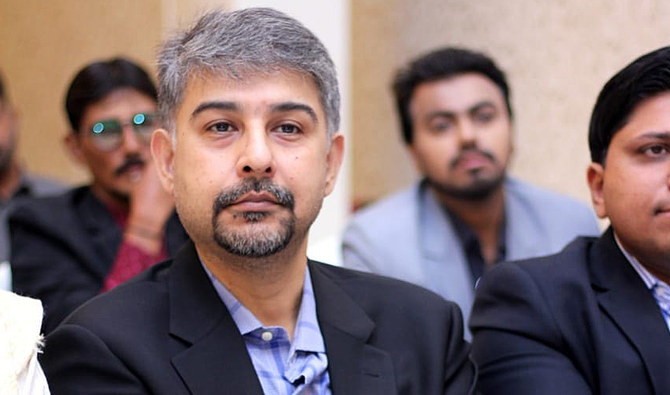
- The accused were convicted of aiding, abetting, reconnaissance, and facilitating murder of Syed Ali Raza Abidi
- Court suspends proceedings against prime accused, citing Supreme Court ruling that prohibits judgments in absentia
KARACHI: A Pakistani court on Monday handed life sentences to four accused who were convicted of aiding, abetting, reconnaissance and facilitating the murder of a Pakistani lawmaker in the southern city of Karachi in 2018.
Ali Raza Abidi, a businessman and politician, who belonged to the Muttahida Qaumi Movement-Pakistan (MQM-P) party, was shot dead outside his residence in the Defense Housing Authority (DHA) area of Karachi.
Police had registered a case against the suspects in the Gizri police station under the Anti-Terrorism Act.
“The evidence shows that all the accused persons in furtherance of their common intention are involved in the commission of murder of Syed Ali Raza Abidi and they are equally responsible for the act,” Zeeshan Akhter Khan, the Anti-Terrorism Court judge, stated in his detailed judgment.
The convicts, Muhammad Farooq, Muhammad Ghazali, Abu Bakar and Abdul Haseeb, were also fined under various sections of the Pakistan Penal Code. They can appeal the verdict within 15 days.
The court, citing a Supreme Court judgment, said since a case against absconding accused, Bilal, Hasnain, Ghulam Mustafa and Faizan, could not be proceeded in absentia, it was placed on dormant status until their arrest or appearance before the court.
Abidi was elected as a Member of the National Assembly (MNA) on the ticket of the MQM-P in the 2013 general election. He, however, quit the MQM-P following the party’s formation of an alliance with the rival Pak Sarzameen Party (PSP).
Despite briefly rejoining the MQM-P in December 2017, Abidi ultimately parted ways with the party in September 2018. He was killed months later on December 25, 2018.
Saudi chemicals giant SABIC targeting net zero by 2050, CEO says
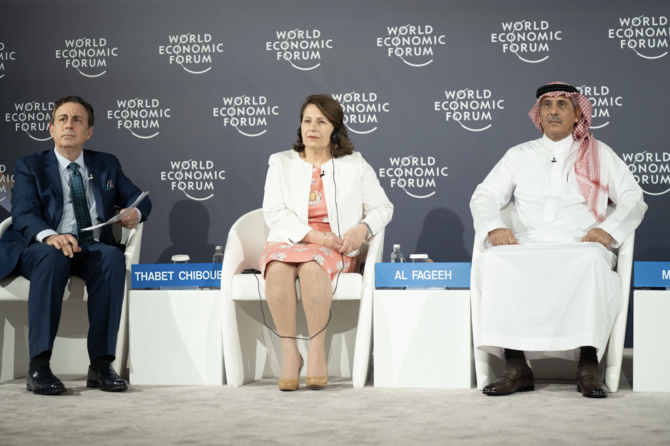
- SABIC aims to convert 1 million tons of waste into feedstock for the petrochemical industry by 2030, Al-Fageeh said
RIYADH: Saudi Arabia’s top chemicals company is turning to circular economy solutions to reach carbon neutrality by 2050 and advance the Kingdom’s net-zero agenda, its CEO has said.
Abdulrahman Al-Fageeh, CEO of the Saudi Basic Industries Corporation, was speaking at the “Demand for Energy ... Transforming Costs into Gains” panel during the special meeting of the World Economic Forum in Riyadh.
SABIC aims to convert 1 million tons of waste into feedstock for the petrochemical industry by 2030, he said.
The circular carbon economy has helped the chemicals sector expand its investment horizon since 2020, he added.
Al-Fageeh said that SABIC marked achievements in energy efficiency and reduced its carbon footprint at the end of 2023 by 12.74 percent. The company is targeting carbon neutrality by 2050.
SABIC has also adopted alternative energy from plastic waste, seeking to produce 1 million tons of sustainably sourced chemicals by 2030.
Energy efficiency
Al-Fageeh said that his company had started sustainability programs at an early stage, improved reliability, developed 90 initiatives and projects, and closed a number of sites due to ineffectiveness.
In 2023, SABIC had more than 200 patents, 40 percent of which related to sustainability in energy efficiency.
Concierge robots set to become reality in the hospitality sector
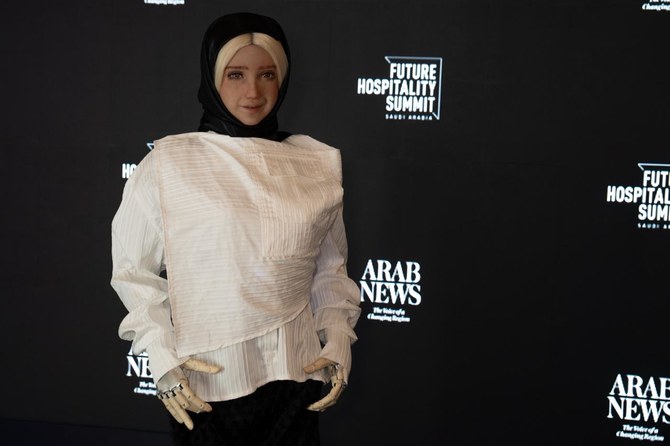
RIYADH: A personal robot concierge is set to become a reality as a new wave of technological innovation takes the spotlight during the Future Hospitality Summit in Riyadh.
In an interview with Arab News during the event, Janet Adams, chief operating officer of global artificial intelligence company SingularityNET, shared details about a new humanoid robot expected to revolutionize the hospitality sector.
“One of our projects which we are pioneering right now is the development of a new class of humanoid robots specifically designed for the service industries,” Adam told Arab News.
“Imagine going to stay in a hotel where you’ve connected with your robot before you go there. They know everything you want. They can greet you at the door because you’ve been chatting as an avatar,” she said.
“And then after you leave, they can stay in touch with you and they can be like a loyalty ambassador, robotic avatar, friend for life who understands your needs, who understands what you enjoy, who makes everything perfect for you in your stay in the hospitality industry,” Adams added.

She further explained that the development, known as the Mind Children project, will roll out its pilot in early 2025.
Furthermore, Adams shared that the company is working on a new breed of technological advancement for AI in language models in the Middle East.
The company is working with Zarqa, a Middle Eastern AI firm part of SingularityNET’s ecosystem, to significantly improve AI language models.
“What we’re doing is we’re taking the best of today’s large language model technology, and we’re infusing it with the best of tomorrow’s artificial general intelligence technology, because we’re leaders in the field of artificial general intelligence,” Adams explained.
“And sometime within the next 12 to 24 months, we expect to see enormous breakthroughs where the limitations of today’s language models are overcome, where we can bring human level reasoning or human style reasoning into our robots and therefore give them the capability to be creative, to understand their environment, to really, truly contribute as a, for example, to hospitality services,” she added.
During the event, SingularityNET also showcased Desdemona, a humanoid robot and the lead vocalist of the Jam Galaxy Band.
“She runs up a huge array of advanced artificial intelligence models. She’s working with vision, with speech processing. We work with toxicity filters. We work with emotion recognition, facial recognition. We have a variety of AI models, including Markov decision-making and generative adversarial networks,” she explained.
“And a bunch of the most advanced AI that’s available on the planet. Together. All work together in this, in what looks like a seamless operation of multiple modules working together. She’s truly a highly advanced miracle of modern AI,” Adams added.
Dubai launches major AI economic strategy
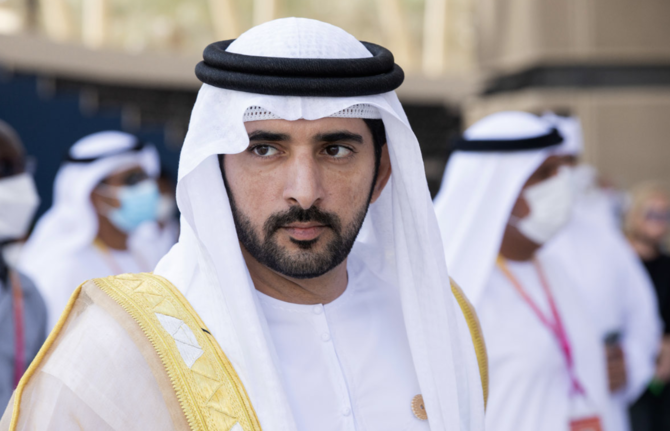
- Crown prince said initial phase of plan, by leveraging AI, would enhance quality of life and well-being for Dubai residents
RIYADH: Dubai’s crown prince on Monday launched a major artificial intelligence drive across government, business and education in the emirate.
The Dubai Universal Blueprint for Artificial Intelligence aims to achieve the Dubai Economic Agenda D33 — to double the size of the economy by 2033 — by adding AED100 billion ($27 billion) from digital transformation and increasing economic productivity by 50 percent.
The strategy includes appointing chief Al officers in government entities, the launch of a Dubai AI and Web3 campus, the launch of AI weeks at the emirate’s schools, a plan to attract data centers and the launch of a trade license for AI.
Sheikh Hamdan bin Mohammed Al-Maktoum said that the initial phase of the plan, by leveraging AI, would enhance quality of life and well-being for Dubai residents.
“Dedicated incubators and campuses for artificial intelligence will be launched to further enhance Dubai’s vibrant AI ecosystem, and finally AI will be celebrated in Dubai schools with the introduction of an AI week,” he said on X.
“We will annually review, update and introduce new projects under this plan, ensuring it keeps pace with all developments. Dubai is a city centered around its people, and to this end, we will dedicate all our resources and energy to make it the happiest place in the world.”
The crown prince said: “In 1999, his highness Sheikh Mohammed bin Rashid Al-Maktoum initiated the pioneering journey of the future by launching Dubai’s digital transformation, a venture that has continued to achieve milestones, leading to the recent unveiling of the Dubai Digital Strategy last year.
“We have realized record-breaking accomplishments that have established us as the premier hub for billion-dollar global enterprises in the technology and artificial intelligence sectors within the region,” he added.
Sheikh Hamdan said that the evolution of AI is presenting opportunities for nations and governments, but posing challenges to those unable to keep pace.
For Dubai, this requires a “swift and adaptive action plan,” responding to the “rapid changes in technology and AI,” he added.


